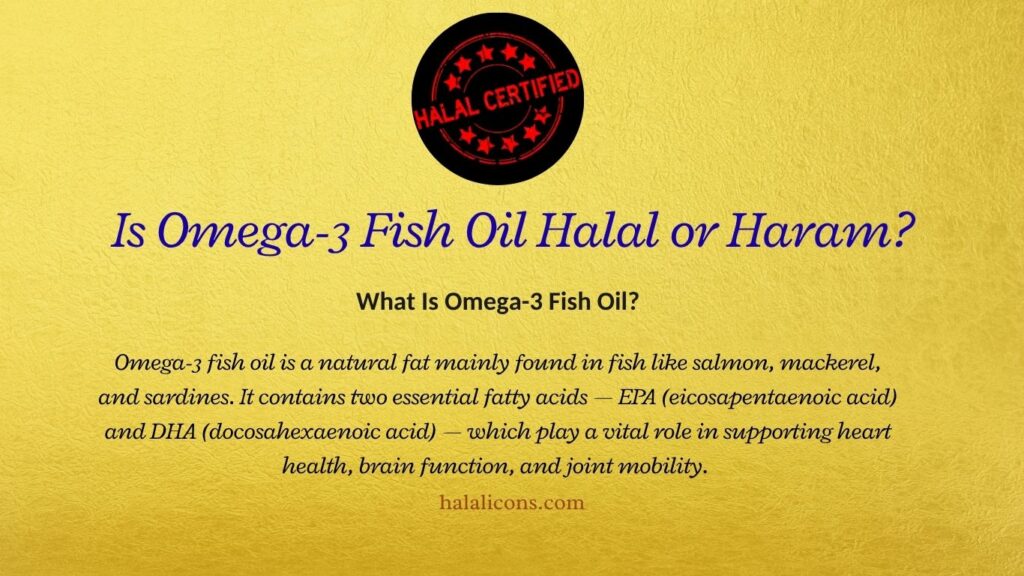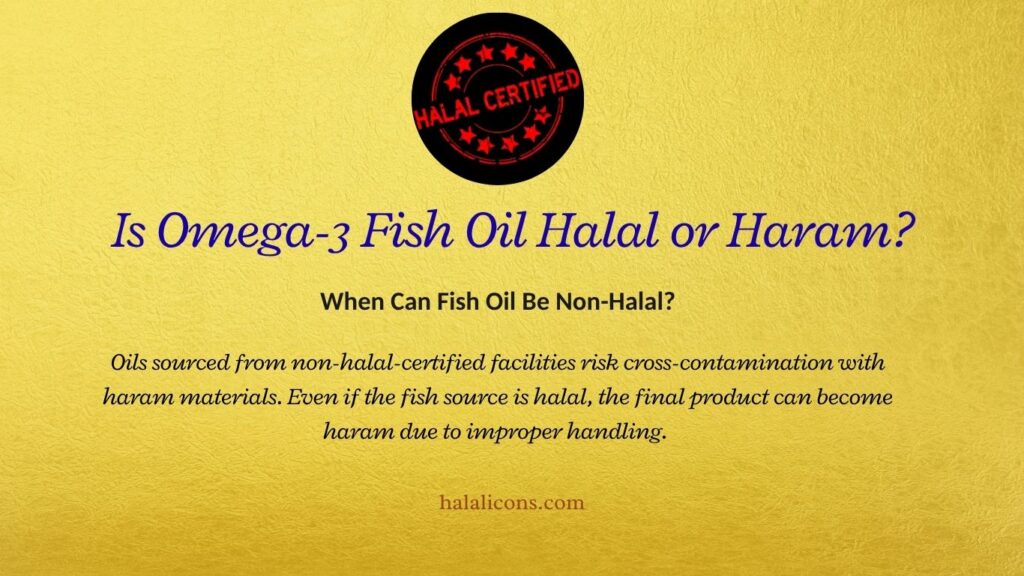Omega-3 fish oil is one of the most popular supplements for heart, brain, and joint health—but for many Muslims, one question comes first: Is it halal? While fish itself is generally halal, the process of extracting and encapsulating fish oil can make things complicated.
Some capsules use pork or non-halal gelatin, while others come from pure fish or halal-certified sources.
Understanding this difference is crucial for those seeking both health benefits and religious compliance. In this guide, we’ll explain everything you need to know about halal omega-3 supplements, from fish sources to gelatin types and the best halal-certified brands to choose from..
What Is Omega-3 Fish Oil?

Omega-3 fish oil is a natural fat mainly found in fish like salmon, mackerel, and sardines. It contains two essential fatty acids — EPA (eicosapentaenoic acid) and DHA (docosahexaenoic acid) — which play a vital role in supporting heart health, brain function, and joint mobility.
These healthy fats are often taken as supplements to balance diets low in oily fish. However, not all omega-3 oils are the same.
Some are extracted from fish, while others come from algae, flaxseed, or chia seeds. Understanding the source and extraction process is key to determining whether your omega-3 fish oil supplement is halal or non-halal.
You might also like: Is Reese’s Peanut Butter Cups HALAL?
Understanding the Halal Perspective
For Muslims, determining whether omega-3 fish oil is halal or haram depends on both the fish source and how the supplement is made. Generally, fish itself is halal, especially those with scales, like salmon or sardines.
The concern arises during the manufacturing process, where non-halal ingredients, such as pork gelatin or alcohol-based flavorings, may be used. If the fish oil is extracted from halal species and encapsulated in halal-certified or fish-based gelatin, it is permissible.
On the other hand, supplements containing porcine gelatin or unverified additives are considered haram. Therefore, understanding these details ensures your omega-3 supplement aligns with Islamic dietary laws.
When Is Fish Oil Halal?

Fish oil is considered halal when it’s derived from permissible fish species and processed without contamination from haram ingredients. Scholars agree that fish with scales—like anchovies, tuna, and salmon—produce halal omega-3 oils. If the capsules use halal-certified bovine or fish gelatin, the product remains pure and permissible.
Additionally, oils that go through cold-press or molecular distillation methods typically preserve purity, making them suitable for Muslim consumers. Always look for a halal certification logo from trusted authorities such as IFANCA, JAKIM, or HFA. This ensures the entire process—from extraction to packaging—follows Islamic guidelines.
When Can Fish Oil Be Non-Halal?
Fish oil may become non-halal when haram substances are introduced during production. The most common issue is pork-derived gelatin used in softgel capsules. Additionally, some manufacturers mix fish oil with ethanol-based flavorings or animal-derived glycerin, making it impermissible.
Oils sourced from non-halal-certified facilities risk cross-contamination with haram materials. Even if the fish source is halal, the final product can become haram due to improper handling.
To avoid this, Muslims should always verify ingredient transparency and choose brands that clearly mention “halal-certified” or “vegetarian capsules.” These details determine whether your omega-3 supplement truly meets Islamic requirements.
You might also like: Is L-Glycine Halal or Haram?
Gelatin Capsule Issue (Most Common Concern)
The gelatin capsule is the main reason many omega-3 supplements aren’t halal. Gelatin can come from pork, non-halal beef, or fish sources, and most commercial supplements use the first two.
However, halal-friendly options now use fish-based or plant-based gelatin, ensuring full compliance with Islamic dietary rules. Always check labels for “halal gelatin,” “fish gelatin,” or “vegetarian capsule (HPMC).”
These are safe alternatives. If the supplement doesn’t specify its gelatin type, contact the manufacturer or look for recognized halal certification symbols. Understanding this simple detail helps you confidently choose a halal omega-3 fish oil supplement that’s both healthy and permissible.
FAQs About Omega-3 Fish Oil and Halal Certification
1. Is omega-3 fish oil halal or haram?
Omega-3 fish oil is halal if it comes from permissible fish sources and is processed without haram ingredients like pork gelatin or alcohol-based flavorings. Always check for halal certification before buying.
2. Why is gelatin in fish oil capsules a concern for Muslims?
Most omega-3 capsules use gelatin derived from pork or non-halal beef, which makes them haram. Look for fish gelatin or vegetarian (HPMC) capsules, which are 100% halal-friendly and safe to use.
3. How can I confirm if my omega-3 supplement is halal certified?
Check the product packaging for logos from trusted certifiers like IFANCA, JAKIM, or HFA. You can also visit the brand’s website or contact customer support to verify their halal certification and manufacturing process.
4. Are all fish automatically halal for omega-3 extraction?
No. While most fish are halal, some schools of thought consider scaleless fish non-halal. Omega-3 derived from scaled fish like sardines, salmon, and anchovies is generally permissible.
5. Is vegan or plant-based omega-3 halal?
Yes, algae-based omega-3 supplements are both halal and vegan. They offer the same EPA and DHA benefits as fish oil without any risk of animal-derived contamination.
6. Can I take omega-3 fish oil during Ramadan?
You can take omega-3 supplements before suhoor or after iftar. However, consuming them during fasting hours breaks the fast since capsules enter the stomach and provide nourishment.
7. What are the best halal-certified omega-3 brands?
Some trusted halal omega-3 supplement brands include Halal Pharma, Noor Vitamins, and Vitabiotics. These brands clearly display their halal certification and use fish or vegetarian capsules.
8. Is cod liver oil halal for Muslims?
Cod liver oil is halal if extracted from halal fish and encapsulated using halal-certified gelatin. However, always verify the capsule source and certification before use.
9. Does omega-3 fish oil contain alcohol or haram ingredients?
Most pure fish oils don’t contain alcohol, but some flavored versions might use alcohol-based flavoring agents. Always read the ingredient list carefully or choose halal-certified products to stay safe.
10. What’s the difference between halal and regular omega-3 supplements?
Halal omega-3 supplements are made under strict Islamic guidelines, ensuring no haram contamination during extraction or encapsulation. Regular omega-3 may use non-halal gelatin or unverified sources.
Final Thoughts
Choosing the right omega-3 fish oil supplement is about more than just health — it’s also about staying true to your faith. While fish itself is halal, the source of the oil, the type of gelatin used, and halal certification determine whether a supplement is truly permissible.
Always look for products with recognized halal logos and transparent ingredient lists. If you’re unsure, opt for halal-certified or vegan omega-3 options made from algae or fish gelatin capsules.
This way, you can enjoy all the heart, brain, and joint health benefits of omega-3 with complete peace of mind — knowing your choice aligns perfectly with Islamic dietary principles and a healthy lifestyle.
Fahad Ali is a youth mentor and social activist committed to empowering the next generation of Muslims. By addressing contemporary issues through an Islamic perspective, He guides young minds in navigating faith, identity, and personal growth in today’s world.